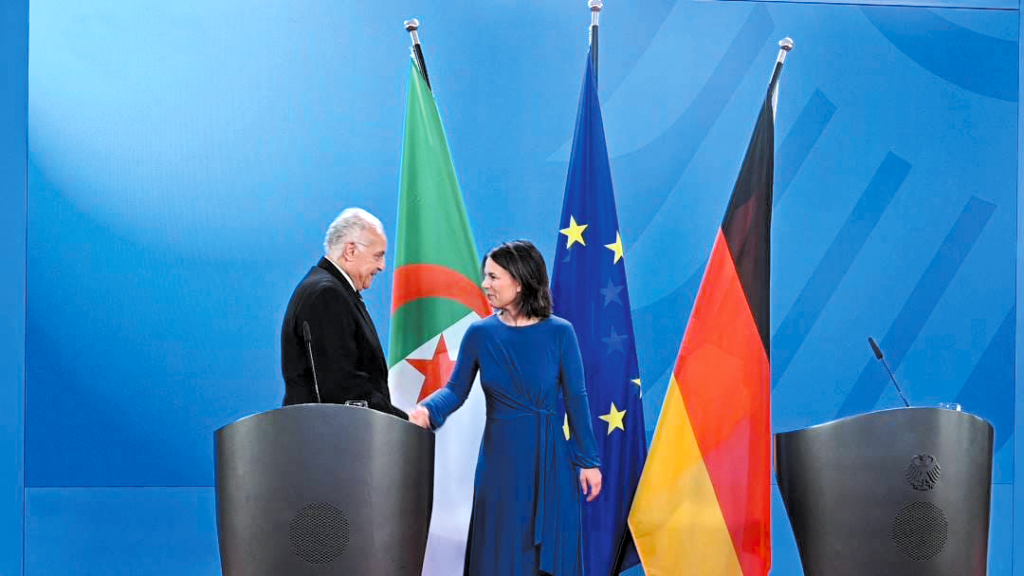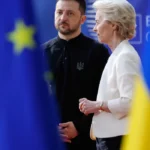Germany, the leading economic power in the euro zone, has been eyeing Algeria in recent months to “adjust” its energy model hitherto backed by Russian gas.
After Rome and Belgrade, the Minister of Foreign Affairs and National Community Abroad (MAE), Ahmed Attaf, traveled to Berlin on Thursday as part of a European tour aimed at strengthening bilateral relations between Algeria and its partners in Europe.
Ahmed Attaf’s visits to Italy, Serbia and Germany, carried out on the instructions of the President of the Republic, Abdelmadjid Tebboune, are part of the consolidation of political dialogue on issues that concern the fundamental and major interests of Algeria and its partners.
Mr. Attaf’s European journey comes less than two weeks after President Tebboune’s state visit to Russia and the signing with his Russian counterpart, Vladimir Putin, of a “Declaration on a deep strategic partnership”.
On the diplomatic level, Mr. Attaf set himself the objective, during this European tour, of consolidating Algeria’s role in its regional environment and reaffirming its status as a responsible and reliable partner on the southern shore of the Mediterranean. .
A role favoring a multilateral approach and promoting a common neighborhood policy in a geopolitical context dominated by energy issues, mainly caused by the Russian-Ukrainian conflict. In Berlin, the Minister of Foreign Affairs thus examined with his German counterpart the “regional and international files of common interest”, underlined a press release from the MAE.
He also co-chaired with the German Minister, Annalena Baerbock, a working session during which the state and prospects of the Algerian-German partnership were reviewed.
The two ministers welcomed, in this respect, “the dynamics of bilateral relations in various sectors, in particular the major joint projects that the two parties aspire to materialize in the field of renewable energies and green hydrogen”, added the same source.
Mr. Attaf and Mrs. Baerbock, on this occasion, reaffirmed their commitment to strengthen consultation and coordination around the situation in the Sahelo-Saharan region, by referring to the peace and reconciliation process in Mali, as well as the crisis in Ukraine in the light of the Algerian mediation initiative “with a view to contributing to international efforts aimed at promoting a peaceful and lasting solution which will put an end to the conflict and make it possible to remedy its consequences and repercussions”, still according to the MFA.
The German Minister, at the end of the working session, hailed “Algeria’s leading role in ensuring energy security in the world and its efforts in its regional space to establish security and stability in Mali, Libya and in the Sahel in general”.
She also congratulated Algeria on its election as a non-permanent member of the Security Council, stressing that her country was ready to share its experience acquired during its last term on the Security Council in 2019-2020.
The head of Algerian diplomacy, for his part, recalled “the depth of the historical relations between the two countries which go back to the Peace Treaty signed between Algeria and Hamburg in 1751”, rejoicing in “their promising prospects, particularly in the technical and energy fields”.
The Minister for Foreign Affairs also held talks yesterday with the Vice-Chancellor and German Minister for the Economy and the Climate, Robert Habeck, on the Algerian-German economic partnership and the prospects for strengthening it, in particular light of the new projects that the two parties aspire to realize in the field of renewable energies and green hydrogen.
SouthH2 Corridor
Mr. Attaf, on this occasion, welcomed the agreement concluded between Germany, Austria and Italy on the South hydrogen project (SoutH2 Corridor), which will pave the way for an extended agreement within the European Union (EU) to support this project which aims to cover 10% of Europe’s energy needs.
The two parties also mentioned the need to start preparations for the next session of the Joint Economic Commission between the two countries by organizing a meeting at the level of experts in Algeria next October.
To this end, Mr. Attaf invited the German Vice-Chancellor to make an official visit to Algeria. Robert Habecka welcomed the invitation, wishing to make it a reality early next year. Germany, the leading economic power in the euro zone, has been eyeing Algeria in recent months to “adjust” its energy model hitherto backed by Russian gas.
It intends to import Algerian gas in this direction from 2024, according to statements by German officials. The European Union (EU), Algeria’s main trading partner, also intends to diversify its energy supplies with our country.
The head of European diplomacy, Josep Borrell, during his recent trip to Algiers, said that the EU wanted to develop its energy partnership with Algeria.
About “90% of Algerian gas exports go to Europe, and we know that we can count on Algeria which is a reliable partner and it has been in difficult times”, he declared to AFP after an interview with President Tebboune.
The EU wishes, he added, to develop this partnership “looking towards the future, by favoring European investments in the renewable energy sector”.
Algeria is the leading African exporter of natural gas. Anxious to diversify their supplies to reduce their dependence on Russian hydrocarbons, several European countries have turned to Algerian gas. On January 19, the CEO of the Italian gas pipeline management company (SNAM), Stefano Venier, underlined the strategic nature of the Galsi gas pipeline project.
The project would, according to him, be an important contribution to relieving Europe’s demand for energy products, in particular Italy and Germany, in search of alternatives to Russian gas.
Significant efforts are being made by Italy to transform itself into a European energy hub, which is essentially based on the strategic partnership that it has sealed with Algeria, relating to the increase in supplies of natural gas and LNG.
This article is originally published on elwatan-dz.com







